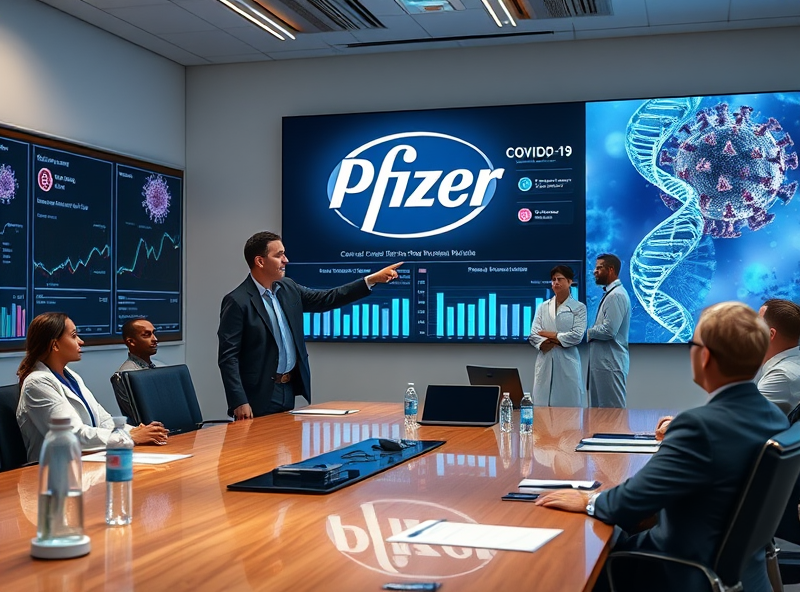
Pfizer’s Post-COVID Strategy: What’s Next for the Pharma Giant?
Strategic Diversification: From COVID to Oncology Innovation

After the global success of its COVID-19 vaccine, Pfizer is strategically shifting its focus toward long-term growth through diversification—especially in oncology. This pivot isn’t just a business move; it’s a meaningful investment in the future of healthcare. Oncology is one of the fastest-growing sectors in medicine, and Pfizer is positioning itself as a leader by expanding its cancer treatment pipeline.
Pfizer has recently acquired several biotech firms, including Seagen, a leader in antibody-drug conjugates (ADCs), which are revolutionizing targeted cancer therapies. These acquisitions not only broaden Pfizer’s portfolio but also bring in cutting-edge technologies that can improve patient outcomes.
In addition to acquisitions, Pfizer is heavily investing in mRNA technology beyond infectious diseases. The company is exploring how mRNA can be used to treat cancers by instructing the body to produce specific proteins that trigger immune responses against tumors.
This strategic diversification benefits patients by accelerating the development of more personalized and effective treatments. It also helps Pfizer maintain its market relevance in a post-pandemic world, ensuring that its innovations continue to support global health.
For more details on Pfizer’s oncology pipeline, you can visit their official pipeline overview: https://www.pfizer.com/science/oncology-research
Driving Efficiency: Cost-Saving Measures and Operational Reform

As Pfizer transitions from its pandemic-era focus, the company is implementing strategic cost-saving measures and operational reforms to remain competitive in a rapidly evolving pharmaceutical landscape. In early 2023, Pfizer announced a $3.5 billion cost-cutting initiative aimed at streamlining operations and offsetting declining COVID-19 product revenues. This move includes workforce reductions, facility consolidations, and increased investment in digital transformation.
One of the key pillars of Pfizer’s strategy is operational efficiency through digitalization. By adopting AI-driven analytics, automating routine processes, and modernizing supply chains, Pfizer aims to reduce redundancies and accelerate drug development timelines. These changes not only lower operational costs but also improve agility in responding to market demands.
Moreover, Pfizer is reallocating resources toward high-growth therapeutic areas such as oncology, rare diseases, and mRNA technology. This shift ensures that R&D spending delivers long-term value, rather than being tied to short-term pandemic-driven products.
For patients and healthcare providers, these reforms could translate into faster access to innovative treatments and more affordable medications in the long run. By focusing on efficiency and strategic reinvestment, Pfizer is positioning itself for sustainable growth in the post-COVID era.
For more details, you can refer to Pfizer’s official Q3 2023 earnings report: https://www.pfizer.com/news/press-release/press-release-detail/pfizer-reports-third-quarter-2023-results
Sustaining Vaccine Relevance: COVID-19 Updates and Future Outlook

As the acute phase of the COVID-19 pandemic fades, Pfizer is shifting its focus toward maintaining the relevance of its vaccine portfolio while preparing for future public health needs. This transition is crucial not only for the company’s long-term growth but also for global health resilience.
Pfizer is now concentrating on three key strategies: updating its COVID-19 vaccines to match emerging variants, integrating COVID-19 shots into routine immunization schedules, and expanding access through global partnerships. The company is actively working on variant-specific boosters, including formulations targeting Omicron subvariants, which continue to circulate globally. This approach ensures that populations remain protected as the virus evolves.
Additionally, Pfizer is advocating for annual COVID-19 vaccinations, similar to the flu shot model. This would help normalize COVID-19 immunization and sustain demand in the post-pandemic era. The company is also investing in combination vaccines that include protection against multiple respiratory viruses, such as influenza and RSV, to improve convenience and compliance.
Beyond product development, Pfizer is collaborating with governments and health organizations to improve vaccine equity, especially in low- and middle-income countries. These efforts are essential to closing the immunization gap and preventing future outbreaks.
By aligning its vaccine strategy with long-term public health goals, Pfizer is not only securing its position in the pharmaceutical market but also contributing to a more resilient global healthcare system.
For more on Pfizer’s latest vaccine developments, visit the official Pfizer Newsroom: https://www.pfizer.com/news/press-release
Strategic Diversification: From COVID to Oncology Innovation

As the world moves beyond the acute phase of the COVID-19 pandemic, Pfizer is strategically pivoting its focus toward long-term growth areas—particularly in R&D, rare diseases, and precision medicine. This shift marks a deliberate transition from pandemic-era vaccine dominance to a diversified innovation pipeline aimed at addressing some of the most complex and underserved areas in healthcare.
Pfizer is investing heavily in its research and development capabilities, with over 100 pipeline programs in various stages of clinical trials. A key focus is rare diseases, which often lack effective treatments due to their complexity and limited patient populations. By leveraging cutting-edge technologies like gene therapy and mRNA platforms, Pfizer aims to bring life-changing therapies to patients with conditions such as Duchenne muscular dystrophy and hemophilia.
Another cornerstone of Pfizer’s post-COVID strategy is precision medicine. This approach tailors treatments based on individual genetic, environmental, and lifestyle factors, improving efficacy and reducing side effects. Pfizer is actively developing targeted oncology therapies, including next-generation cancer immunotherapies and small molecule inhibitors, to offer more personalized and effective cancer care.
These efforts not only reflect Pfizer’s commitment to scientific innovation but also signal a broader industry trend toward more patient-centric and data-driven healthcare solutions. For patients and healthcare providers, this means more hope, better outcomes, and a future where medicine is as unique as the individual it treats.
For more information on Pfizer’s pipeline, visit their official R&D overview: https://www.pfizer.com/science/research-development







